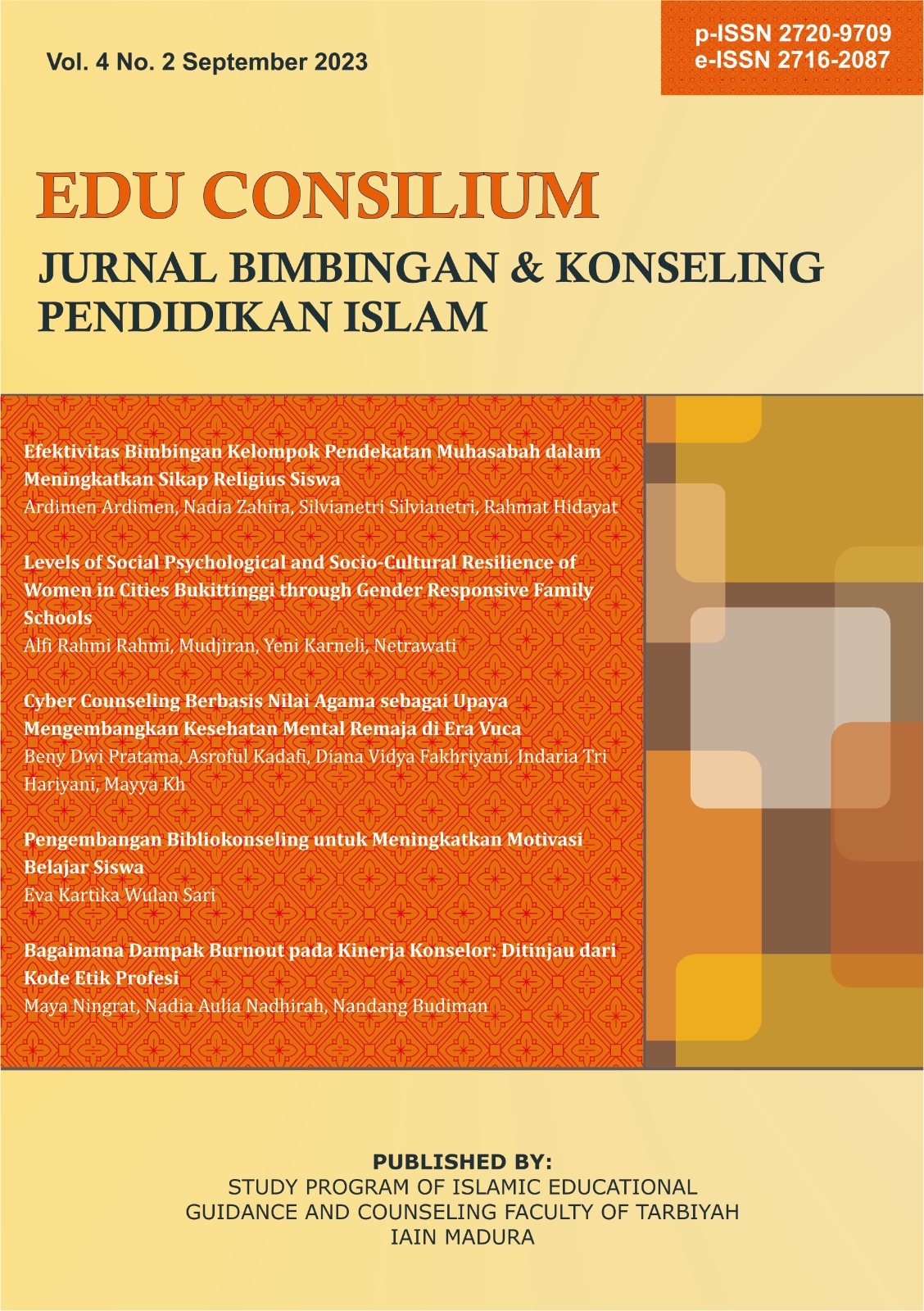Pengembangan Bibliokonseling untuk Meningkatkan Motivasi Belajar Siswa
 Abstract views: 408
,
Abstract views: 408
,
 PDF downloads: 404
PDF downloads: 404
Abstract
Students experience learning motivation problems that come from internal factors, namely feeling lazy to study. The right technique to increase learning motivation is Bibliocounseling because it is a form of therapeutic support through reading materials to help students who have problems. Development was carried out using the ADDIE model. Through four research instruments, namely, a needs questionnaire, an interview guide, a learning motivation scale, and an assessment format for Bibliocounseling books. There are three stages in assessing the validity and reliability of Bibliocounseling, namely testing the validity and reliability of counseling material experts, media, and language. Quantitative and qualitative data were obtained, then processed, then used as a basis for continuing the development of Bibliocounseling values. The validity and reliability assessment shows that the product is made is valid and reliable because it meets the aspects of usability, attractiveness, convenience, and accuracy so it is hoped that it can increase student learning motivation.
Downloads
References
Annajih, M. Z. H., & Saidah, I. (2023). Revitalisasi Peran Konselor: Arah Baru Konseling Berbasis Kipas Menuju Profesionalisasi Konselor. DA'WA: Jurnal Bimbingan Penyuluhan & Konseling Islam, 2(2).
Atmoko, A., & Hidayah, N. (2021). Improving Student Social Skills Using Bibliocounseling Techniques During the COVID-19 Pandemic. Turkish Online Journal of Qualitative Inquiry, 12(9).
Atthohiri, M. M., & Saidah, I. (2022). Hubungan tanggung jawab belajar dengan kemandirian siswa di MTs Al-Mukhlishin Galis Pamekasan. DA'WA: Jurnal Bimbingan Penyuluhan & Konseling Islam, 1(2).
Bereiter, C., & Scardamalia, M. (2018). Intentional learning as a goal of instruction. In Knowing, learning, and instruction (pp. 361–392). Routledge.
Blossfeld, H.-P., & Von Maurice, J. (2019). Education as a lifelong process. Springer.
Boakes, R. A. (2021). Performance on learning to associate a stimulus with positive reinforcement. In Operant-pavlovian interactions (pp. 67–101). Routledge.
Bower, M., Howe, C., McCredie, N., Robinson, A., & Grover, D. (2014). Augmented Reality in education–cases, places and potentials. Educational Media International, 51(1), 1–15.
Branch, R. M. (2009). Instructional Design: The ADDIE Approach. Springer Science & Business Media. https://www.springer.com/gp/book/9780387095059
Domjan, M. P. (2014). The principles of learning and behavior. Cengage Learning.
Gunawan, G., Kustiani, L., & Hariani, L. S. (2018). Faktor-faktor yang mempengaruhi hasil belajar siswa. Jurnal Penelitian Dan Pendidikan IPS, 12(1), 14–22.
Ireland, G. W., & Lent, R. W. (2018). Career exploration and decision-making learning experiences: A test of the career self-management model. Journal of Vocational Behavior, 106, 37–47.
Johansson‐Sköldberg, U., Woodilla, J., & Çetinkaya, M. (2013). Design thinking: past, present and possible futures. Creativity and Innovation Management, 22(2), 121–146.
Kintu, M. J., Zhu, C., & Kagambe, E. (2017). Blended learning effectiveness: the relationship between student characteristics, design features and outcomes. International Journal of Educational Technology in Higher Education, 14(1), 1–20.
Lasan, B. B. (2018). Blended Bibliocounseling. 3rd International Conference on Educational Management and Administration (CoEMA 2018), 110–114.
Lin, M.-H., & Chen, H. (2017). A study of the effects of digital learning on learning motivation and learning outcome. Eurasia Journal of Mathematics, Science and Technology Education, 13(7), 3553–3564.
Mahyuddin, M. J., Sulaiman, F., & Suryani, A. (2021). Efforts to Overcome Truancy Behavior in Students with Biblio-Counseling (Studies in Class IX C SMP Negeri Wonomulyo). Budapest International Research and Critics Institute-Journal (BIRCI-Journal), 4(1), 1012–1020.
Molenda, M. (2003). The ADDIE Model. In Encyclopedia of Educational Technology, ABC-CLIO.
Prakoso, E. T., & Kristianti, W. R. (2017). Biblio Counseling To Reduce The Effectiveness Of Student Academic Procrastination Force Of Guidance And Counseling. Satya Widya, 33(2), 93–98.
Puspitarini, Y. D., & Hanif, M. (2019). Using Learning Media to Increase Learning Motivation in Elementary School. Anatolian Journal of Education, 4(2), 53–60.
Rokhyani, E., Sugiyo, S., & Purwanto, E. (2019). Bibliocounseling To Enhance Resilience Of Bullying Victims Students At Junior High School In Nganjuk, East Java. ISET 2019: Proceedings of the 5th International Conference on Science, Education and Technology, ISET 2019, 29th June 2019, Semarang, Central Java, Indonesia, 45.
Sa'idah, I. (2022). Kreativitas Guru Bimbingan dan Konseling dalam Mengembangkan Minat Belajar Siswa. DA'WA: Jurnal Bimbingan Penyuluhan & Konseling Islam, 2(1).
Salau, T. L., Wibowo, M. E., & Loekmono, J. T. L. (2017). Pengembangan Model Bimbingan Kelompok Teknik Bibliocounseling untuk Meningkatkan Sikap Forgiveness Siswa SMA Swasta Kota Atambua. Jurnal Bimbingan Konseling, 6(2), 196–205.
Sari, E. K. W. (2019). Enhancing Students’ Learning Motivation through Bibliocounseling Technique. The International Journal of Counselling and Education, 4(1), 2019.
Simbolon, N. (2014). Faktor-faktor yang mempengaruhi minat belajar peserta didik. Elementary School Journal Pgsd Fip Unimed, 1(2).
Soejanto, L. T., Sari, E. K. W., & Silvianingsih, S. (2021). Using Bibliocounseling to Improve High-School Student’s Social Intelligence. International Journal of Research in Education, 1(1), 1–5.
Susilo, A. T. (2020). Bibliocounseling: The Therapeutic Techniques of Guidance and Counseling Services for Higher Education. Proceedings of the 4th International Conference on Learning Innovation and Quality Education, 1–7.
Utami, G. N. A. (2020). Efektivitas Teknik Bibliocounseling Untuk Meningkatkan Pengendalian Emosi Pada Siswa Kelas X MIPA Di SMA Negeri 7 Banjarmasin. Jurnal Pelayanan Bimbingan Dan Konseling, 3(2).
Van Liefferinge, D., Sonuga-Barke, E., Danckaerts, M., Fayn, K., Van Broeck, N., & van der Oord, S. (2018). Measuring child and adolescent emotional lability: How do questionnaire-based ratings relate to experienced and observed emotion in everyday life and experimental settings? International Journal of Methods in Psychiatric Research, 27(3), e1720. https://doi.org/10.1002/mpr.1720
Yamin, M., & Syahrir, S. (2020). Pembangunan pendidikan merdeka belajar (telaah metode pembelajaran). Jurnal Ilmiah Mandala Education, 6(1).
The journal operates an Open Access policy under a Creative Commons Non-Commercial 4.0 International license. Authors who publish with this journal agree to the following terms:
- Authors retain copyright and grant the journal right of first publication with the work simultaneously licensed under a
 Commons Attribution-NonCommercial 4.0 International License
Commons Attribution-NonCommercial 4.0 International Licensethat allows others to share — copy and redistribute the material in any medium or format, and adapt — remix, transform, and build upon the material.
- Authors are able to enter into separate, additional contractual arrangements for the non-exclusive distribution of the journal's published version of the work (e.g., post it to an institutional repository or publish it in a book), with an acknowledgement of its initial publication in this journal.
- Authors are permitted and encouraged to post their work online (e.g., in institutional repositories or on their website) prior to and during the submission process, as it can lead to productive exchanges, as well as earlier and greater citation of published work (see The Effect of Open Access).




















